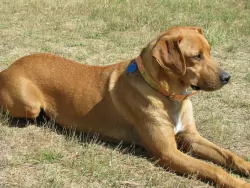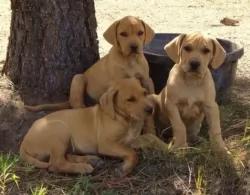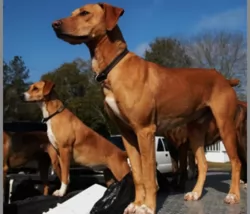 MyDogBreeds
MyDogBreeds Mountain View Cur is originated from United States but Austrailian Blue Heeler is originated from Australia. Mountain View Cur may grow 16 cm / 7 inches higher than Austrailian Blue Heeler. Mountain View Cur may weigh 13 kg / 29 pounds more than Austrailian Blue Heeler. Both Mountain View Cur and Austrailian Blue Heeler has same life span. Both Mountain View Cur and Austrailian Blue Heeler has almost same litter size. Mountain View Cur requires Low maintenance. But Austrailian Blue Heeler requires High maintenance
Mountain View Cur is originated from United States but Austrailian Blue Heeler is originated from Australia. Mountain View Cur may grow 16 cm / 7 inches higher than Austrailian Blue Heeler. Mountain View Cur may weigh 13 kg / 29 pounds more than Austrailian Blue Heeler. Both Mountain View Cur and Austrailian Blue Heeler has same life span. Both Mountain View Cur and Austrailian Blue Heeler has almost same litter size. Mountain View Cur requires Low maintenance. But Austrailian Blue Heeler requires High maintenance
 The Mountain View Cur is an American bred dog that resulted from years of deliberate breeding and careful culling of the litters to improve the Mountain Cur into a hunting dog with a better temperament and a stronger hunting instinct. Because of these generations of culling and refining the Mountain View Cur is so uniform within the breed that it is considered a thoroughbred as well as a purebred. Developed at the end of the 1980’s by Michael and Marie Bloodgood. The foundation for their breeding program was the Mountain Cur.
The Mountain View Cur is an American bred dog that resulted from years of deliberate breeding and careful culling of the litters to improve the Mountain Cur into a hunting dog with a better temperament and a stronger hunting instinct. Because of these generations of culling and refining the Mountain View Cur is so uniform within the breed that it is considered a thoroughbred as well as a purebred. Developed at the end of the 1980’s by Michael and Marie Bloodgood. The foundation for their breeding program was the Mountain Cur.
The new Mountain View Cur were meant to be stronger in every way than the original Mountain Cur. They could track, hunt and tree both large and small prey. It’s work ethic is unsurpassed regardless of the weather or terrain. Highly intelligent and motivated the Mount View Cur can use its incredible prey drive to follow the game at any cost. Yet it can be trusted off lease because while hunting the Mountain View Cur will instinctively go to the hunter and check in occasionally.
This breed is ultimate hunter, known for treeing squirrels and racoons. His strongest drive is to please the human he is with. He has a gentle, loving temperament. Because of their desire to please, they are great companion animals as well as hunters. In addition to coons and squirrels, the Mountain View Cur could hunt possum, coyote, pheasants, turkey, hare, grouse, hare and rabbits. They are also willing to fight with lions, bobcats, bears, and wild boars. Surprisingly they can herd as well.
They are a healthy breed and very hearty with a long lifespan. They are extremely popular in the mountains and hills of Appalachia, but they are rare and almost unknown outside the United States. Puppies are very expensive and there is a waiting list that could be very long. The original Mountain View Curs descended from just two Mountain Curs – one male, one female. As the program went on Mountain View Curs were bred to Mountain Views Curs and then other Mountain Curs were added in.
Originally the breed was registered as a part of the Kemmer Stock Breeders Association Registry. Eventually however the breeders of View Curs came to believe that they had an entirely new breed and the American Squirrel and Night Hunters Association was the choice to register the breed in 1995. One year later the Mountain View Cur Registry was founded.
 In 1840, George Elliott made a match with Australian Dingo and Collie and got a clever and very active dog breed – Australian Blue Heeler. Soon, he showed his good herding instincts and protective nature and got really popular among the cattlemen and ranchers. Soon, as the USA soldiers arrived in Australia, they decided that it will be a great dog to bring home.
In 1840, George Elliott made a match with Australian Dingo and Collie and got a clever and very active dog breed – Australian Blue Heeler. Soon, he showed his good herding instincts and protective nature and got really popular among the cattlemen and ranchers. Soon, as the USA soldiers arrived in Australia, they decided that it will be a great dog to bring home.
Australian Blue Heeler has short, double coat. The coat is water resistant and helps them when the temperature is too high as well. Their coat is rough to the touch, naturally. They can be found in blue or red coat colour mix. The Blue Heeler isn’t actually blue, but their black coat has a bluish tint. Red Heelers have red fur instead of black. They have long tails, strong legs, Dingo-like heads with pointy ears and muscular necks and balanced and athletic bodies.
 The Mountain View Cur is a rugged, healthy breed that has very little in common with its ancestor the Mountain Cur at least in its looks. The Mountain View Cur is born with no dewclaws while the Mountain Cur has them. The Mountain View Cur is a stronger and more muscular breed as well. They have a flat domed head with ears that are high set and short. Her eyes are dark and prominent, its neck and back strong and muscular, while its chest is deep. Half the pups are born with a bobtail and half have their tales docked. About 10% are black, brindle or brindle and black. They all have white on the feet, chest and muzzle.
The Mountain View Cur is a rugged, healthy breed that has very little in common with its ancestor the Mountain Cur at least in its looks. The Mountain View Cur is born with no dewclaws while the Mountain Cur has them. The Mountain View Cur is a stronger and more muscular breed as well. They have a flat domed head with ears that are high set and short. Her eyes are dark and prominent, its neck and back strong and muscular, while its chest is deep. Half the pups are born with a bobtail and half have their tales docked. About 10% are black, brindle or brindle and black. They all have white on the feet, chest and muzzle.
 This breed is somehow designed for an outdoor life and outdoor activity. This implies that Blue Heelers have nature made of the high dose of energy. They are always ready to go anywhere you go, and they will be a loyal friend. They are actually very clever, intelligent and ready to help.
This breed is somehow designed for an outdoor life and outdoor activity. This implies that Blue Heelers have nature made of the high dose of energy. They are always ready to go anywhere you go, and they will be a loyal friend. They are actually very clever, intelligent and ready to help.
If you are a type of the person who prefers being indoors and having minimal physical activity, Blue heelers are not the type of a furry companion for you. They have a high daily need for the activity, and they love having lots of space to run and explore. Sometimes, you will realize that having a leash is a must because they will get so playful that they will forget about you!
If you start teaching them to be friendly with other dogs while they are still pups, they will accept that kind of lifestyle. But, if your Blue Heeler is raised as the only dog on the ranch, note that they won’t be very friendly toward other dogs.
Since most of the herd dogs usually respond to only one person, most of the Blue Heelers can follow this old instinct. They can be very independent, as well, and they are usually not the type of the dog that will always be around your leg waiting for a cuddle or ear scratch. But, they build the respect towards humans depending on how they treat him so they can be very lovable and friendly pets.
If you are still confused about their name, you must know that the Blue Heelers can actually lightly nip your heel for attention. They are not aggressive, but they tend to be very protective of the family, humans around them and their property.
 Very child friendly, playful and gentle
Very child friendly, playful and gentle
Scent and well-disciplined self-control
This breed is designed to work and to hunt. They are happiest when they have a job or are in the woods with you. They have excess energy and need space. They will not do well as a 24 hour inside dogs. They need space to run and hunt.
Highly intelligent, excellent ability to learn whatever you want to teach them.
 They are generally good with children, but you must be aware of their inherent desire to herd. Always supervise when your Blue Heeler is around small children.
They are generally good with children, but you must be aware of their inherent desire to herd. Always supervise when your Blue Heeler is around small children.
Ball tricks, frisbee fun, running companion, herding cattle.
It is best to buy a puppy. These dogs get attached to one human and to the territory.
They are generally quick learners. If you teach them to be playful, friendly and loving, they will learn it in no time. So be aware of the decisions that can cost you when the dog grows up.
 The Mountain View Cur is a very healthy breed without a lot of genetic issues due to the purity and isolation of the breed. No genetic deformities or illness. They are susceptible to a few health concerns.
The Mountain View Cur is a very healthy breed without a lot of genetic issues due to the purity and isolation of the breed. No genetic deformities or illness. They are susceptible to a few health concerns.
Bloat – like most larger dogs, the Mountain View Cur is susceptible to bloat. This occurs when the dog’s internal organs, stomach and intestines become inverted and twisted. This can occur when the dog eats a large meal immediately before or after strenuous exercise.
 Progressive Retinal Atrophy usually causes slow and painless loss of sight. This process takes years, but there are cases where this disease took only months before the dog ended up completely blind.
It is advisable to take your Blue Heeler to the vet for a test that can tell you if your dog is carrying the gene for this disease.
Progressive Retinal Atrophy usually causes slow and painless loss of sight. This process takes years, but there are cases where this disease took only months before the dog ended up completely blind.
It is advisable to take your Blue Heeler to the vet for a test that can tell you if your dog is carrying the gene for this disease.
Lens luxation is a disease where the lens of dog’s eye separates partially or completely. Good news is that this disease can be treated.
Most common is the hip or elbow dysplasia. This is the disease where hip joints do not develop properly and begin to grind. This condition can sometimes be treated with physiotherapy, but there is a chance that your Blue Heeler will need a surgery. If you have a habit of regular vet checks and keeping your dog slim and fed with quality food, you can a make a big difference.
Osteochondritis Dissecans (OCD) causes the dog to have excess cartilage and deficient bone, where cartilage does not get replaced by bone during fetal development. This disease usually requires surgery and prescribed medicines.
Congenital hereditary sensorineural deafness – CHSD is a common form of deafness.
Bilateral deafness can be identified when the dog is still a puppy, more-less at six weeks of age. A puppy with deafness in only one ear is harder to identify, but it can happen.
Portosystemic shunt means that the blood flow is getting back into the bloodstream instead of passing through the liver. That means that liver can’t clear out the toxins, and the organ itself fails to grow properly. This inherited type of shunt can be treated with surgery if the diagnose is set on time.
 The Mountain View Cur puppy after 12 weeks of age will need to eat 3 meals per day until they are 6 months old. From 6 months to one year they need 2 meals a day. They need high quality dry dog food made especially for puppies that will become large dogs.
The Mountain View Cur puppy after 12 weeks of age will need to eat 3 meals per day until they are 6 months old. From 6 months to one year they need 2 meals a day. They need high quality dry dog food made especially for puppies that will become large dogs.
An adult Mountain View Cur can eat only once a day and be healthy. They need a high quality dry food for large dogs.
Extremely healthy breed with stamina and speed.
The Mountain View Cur is a hunter and an extremely active one at that. They also have herding tendencies. Though they are not hyper, they need a lot of exercise. They also need a job. They want nothing more than to please their person, but they need a job to stimulate both his body and mind. He needs daily walks and a fenced yard to run in. They are good at agility, search and rescue, herding, field trials, police work, and hunting.
 Choose a dog food that will provide nutrients that will help in the bone developing. Since they are more likely to suffer from joint diseases, you must take this advice seriously. It would be great if you speak about this with your vet before you choose food on your own.
Choose a dog food that will provide nutrients that will help in the bone developing. Since they are more likely to suffer from joint diseases, you must take this advice seriously. It would be great if you speak about this with your vet before you choose food on your own.
The best food for Blue Heeler is a high-quality food which supplies them with premium nutrition to fuel their activity.
They also drink a lot of water, so be sure that they always have a fresh water available.
Lots and lots of the outdoor activity and a quality food. You must be very cautious because this kind of dogs gets overweight easily because they just love the treats and extra food portion.
Any outdoor activity that is mentally challenging and interesting enough to keep them from running in the field trying to catch anything that moves.